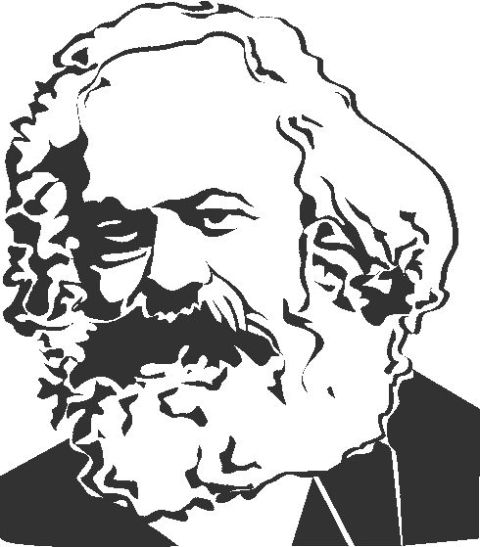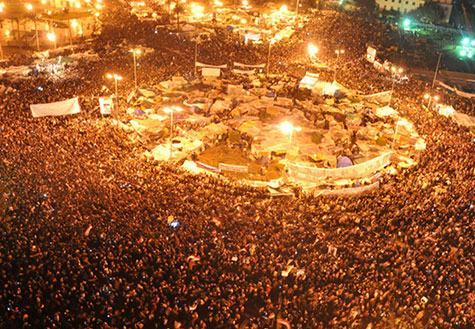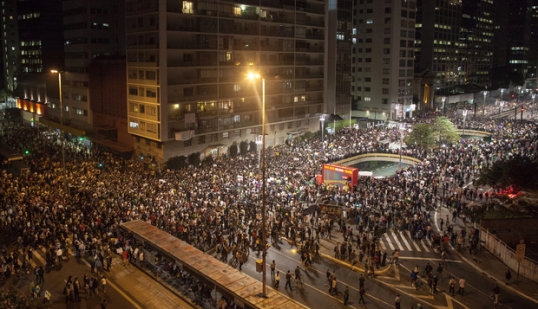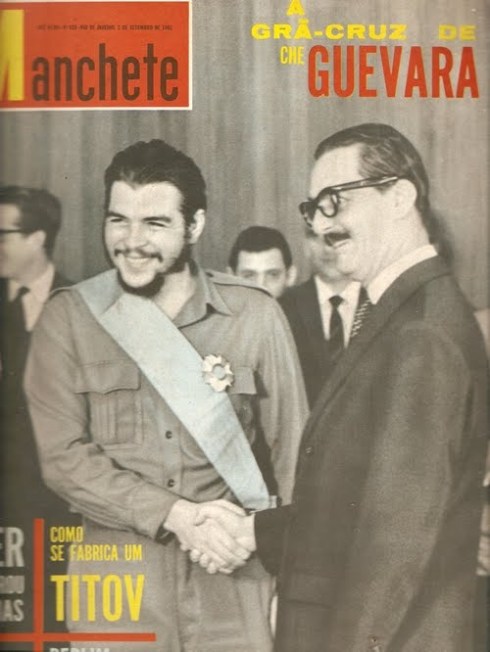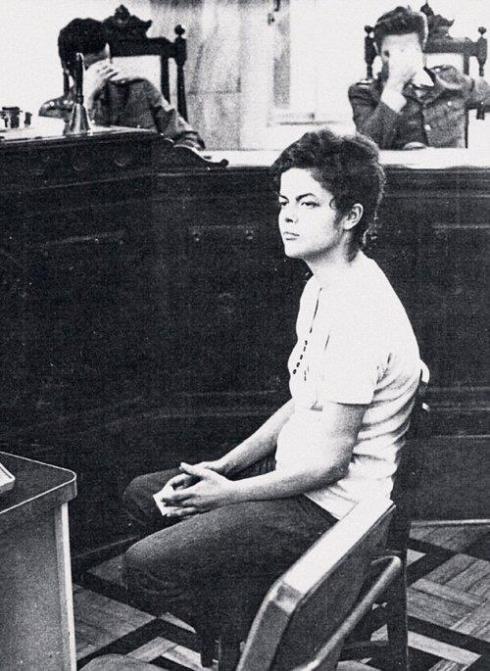Lost Sambista
A Brazil never seen.
Archive for the tag “politics”
Where Marx went right and where Marx went wrong
Whoever dares to break all the neo-liberal, and middle class taboos and ventures to read Karl Marx’s Communist Manifesto will ask himself if this is not a post that some blogger wrote one month ago. He will also start to understand why for one hundred and fifty years the words on those pages have been the greatest fear of our “beloved” bankers, industry leaders and heads of state in the Western World.
The one reason for the fear over that text is that it has made perfect sense for a century and a half; Marx’s critique is precise and undeniable and reality keeps on confirming his views. Needless to say, as Christians in the Roman times, the powers of the day have thrown many people to the lions for embracing this forbidden belief.
Before we continue, in order to rebuke the usual attacks, we will have to point out that what existed in the Soviet Union and behind the “Iron Curtain” was not communism. They saw themselves as societies working towards communism; and most ended up as flawed attempts to reach a utopic state of social equality. It is also worthwhile pointing out that they were as flawed as the western attempts to create their utopia; general contentment and optimization of resources through the “invisible hand” of the Market.
Going back to our quest for where Marx went right and where Marx went wrong, we’ll start with what went right. A recent article in nowhere less than the Rolling Stone Magazine states it succinctly in five examples:
The tendency of Capitalism to create crisis: In their need to reduce costs, companies, investors etc… drive down salaries, cut down their workforce to a point where there this affects the consumer market because there is no one left to consume. Even in the best days they come up with schemes to induce more consumption such as credit, but when this money turns into debt it only worsens the crisis in the cycle.
The creation of absurd consumerist desires: to keep the machine alive capitalism induces people to consume industrialized and technological “monstrosities” with absurd values. They become carrots on sticks for the workforce to dedicate their lives to. The examples are out there in abundance; Ferrari’s, the latest iPhones, the latest kindles, overpriced coffee Houses, overpriced holiday locations, the list is long.
Globalization: Capitalism has an insatiable appetite for new markets, not only for more people to consume its products but also to supply them with cheap labour. Could this explain why the west went as far as to finance radical Islam in order to bring those markets into the world order? This may explain why there is no place in the world to escape Capitalism. Une could argue that this just shows that this is the “logic of the world”, the “reality” as it is. But then, why do we need police and armies to back things up and to repress people who go against the system? As the neo-Marxist thinker, Slavoj Zizek, states; people find it easier to imagine a planet without natural resources than to imagine the world without Capitalism,
Tendency towards Monopoly: the logic of maximizing profits and leaving the regulation of the economy to competition leads to the big sharks eating all the other fish in the pond. One doesn’t need to go far to see small stores, small software companies, small everything almost disappearing while, as the economy recovers, it is the big guys who have managed to survive and now are having greater profits than ever.
Low wages and high profits: The essence of Capitalism is to create an “army” of workers who only have their workforce to put on the table when it comes to making a living. The people who do have the means employ them try to pay as little as they can to obtain as much profit as they can. They do this not because they are evil; it is just the logic of the system, if they do not, some ruthless competitor will end up forcing them out of business.
There are many other points that the article could have added, the main one being the founding stone of Marx’s thought: placing profit as the central motor of a society will never work. Contrary to what Wall Street, the City and their lackeys say, greed is a very bad policy maker, simply because it is self-serving. One does not need to be a rocket scientist to figure out that if you allow big profit oriented conglomerates to drive politics they will act in no one else’s interest but their own. One just needs to look at the trillionaire Bank bailouts in 2008 and their current “social responsibility” to understand why.
Until now, we have only seen where Marx went right, where did he go wrong?
The problem lies in his solutions. Actually, not in his solutions but in his lack of proposals. This is where both Marxist radicals and hysterical anti-Marxists fall into a realm of mystification and lack of understanding. Throughout his work except for some rare opinions and hints, he never really stopped to write about how a communist state would be nor how humanity would ever get there.
As we all know, his opinion was that communism is an inevitable state that we will all end up in, regardless of the route we choose. For him, communism is a utopian state of affairs where the means of production will be aimed at the community (hence the name) and not at private profit. Again, we have to mention that the mainstream theories also have their own utopia where, if left to their own devices, the selfish agents of the economy will optimize the resources available to humankind and will create generalized wealth in the most optimized way possible.
Both utopias stem out of the Judeo-Christian-Muslim messianic belief that history has a goal. For both, intelligence or the God-like qualities blown by the Almighty into mud to create Adam will eventually flower into a world of mutual understanding that will be fair for all. This is a very powerful concept that has kept not only religions, but the entire political debate alive.
For Marxists, the good days will come through a revolution, for the Monetarists they will come through the general acceptance of the Market, for the Christians they will come through the universal acceptance of Christ, for the Muslims through the universal acceptance of the prophet and for the Jews through the coming of the Messiah. There are different versions and for each of these myths but they are all saying the same thing.
It is our opinion that Marxism is the latest step of the utopian tradition, it is a natural follow up to the revolutionary Christian concept of the holy Ghost: forget all dogma, forget the laws, get along with each other and create something sacred. The problem here, as with all other Messianic views is that it privileges the future rather than the present.
As a revolutionary in Tahrir square sais at the end of the fabulous documentary The Square, after seeing his struggle being kidnapped by the Egypt’s military and by the Muslim Brotherhood, “We fought for a new way for people to relate to each other, the people have taken over the streets and now we know our strength.”
Our opinion is that he nailed the issue; the key is the here and the now, not the future not the past. The possibility for change comes to us every day and in every situation and it comes from within, it lies in the way we relate to each other, it lies is in doing the right thing, it stems from the courage of standing up against what is wrong. If people see themselves personally responsible for improving the world and their lives things can change. We all know deep inside what is wrong and it is within our reach to change them. This is not about a takeover revolution with parties, armies and new leaders but about an enormous pressure on the institutions where we work, on the organizations who make products that are vital for us, on what the state gives back to us as tax payers and on the way we relate to each other. This is about ending the “us and them” stalemate, a macro revolution based on an infinitude of micro revolutions.
Brazilian protests – reflections on a confusion
The past weeks have been very revealing about where Brazilian politics stand. Although the rallies were not as big in size and in impact compared to decisive ones such as the Diretas Ja and the Fora Collor they showed what a large and influential portion of Brazilians are feeling about their politicians and their Government. President Dilma Roussef‘s camp now knows that before trying to project their country as an international power broker, there is still a lot of homework to be done.
The biggest novelty is that mixed with the denunciation of maneuvers that corrupt politicians have done to make themselves immune from public prosecution, discontent with overspending in the construction of Stadiums for the world cup and a plethora of other complaints that have accumulated over 10 years of Lula’s PT (Partido dos Trabalhadores) in power, there has been a strong right wing agenda of overthrowing the government lurking in the shadows. This anti-socialist sentiment has not been so strong since the days preceding Brazil’s military coup in 1964 and it is in the private comments and in postings in the social media that the true colors of what is happening have revealed themselves.
The fear of a government seeking to improve the conditions of its most destitute citizens, or worse representing them, is deeply entrenched among the Brazilian privileged who only five generations ago owned slaves. After the humiliation of having a working class president doing a better job than one of them in power by reducing social inequalities, by growing the country’s economy, by receiving international recognition and by indeed bringing the Olympics and the Fifa World Cup to Brazil; understating the achievements of the PT is no novelty in Brazilian wealthier circles. But now, as growth slows down it has become easier to rally public opinion from other classes and make up a critical mass to cause something significant and, who knows, bring the country back to its traditional class system while being subserviently attached to the “developed world”.
After years of relative tranquility, the left has also woken up and now in the social media and in the streets the debate is heated. So far the attacks, verbal and written only, have been against politicians and current and governments and we hope that the animosity will not escalate into hostilities between individuals or between organizations. Brazil has no history of civil war and its independence was granted by Portugal’s King in exile, so fighting to the bitter end for ideals is very rare. There have been internal armed conflicts in the past but they were either of militias against militias or, mainly, of the disorganized mass against government troops or in the sixties of paramilitary left wing cells against the armed forces.
Both the dangerous and the tranquillizing factors in this internal struggle lie in Brazil’s political immaturity. On the one hand, unlike the middle east, the demonstrations are almost a political continuation of the cathartic spirit of the football stadiums and of the carnivals. They are not angry despite the very rare cases of vandalism which are next to nothing when compared to what went on recently in London and a few years ago in Paris. The rallies happen in a good humored and family friendly environment, it is the educated middle class that frequents them after all. The danger lies in the naifness of protesting for one thing, against corruption, but being used for something else, topple the government.
On this topic we see a worrying tendency of wanting to overthrow the political class as a whole and install some kind of moral rule, which can only be compared to fascism or an Iranian style religious/moral autocracy. There are no political parties heading the protests only very suspicious “Anonymous” calls for actions, which makes us wonder who is ultimately behind these protests not only in Brazil but all over the world. These kind of world wide generic, internet based protests, that have caused political tragedies in the majority of the countries where they happened, are a new fact in Brazilian politics. We believe and hope that the young and far from perfect Brazilian democracy is solid enough to take the blow and will come out of this incident strengthened.
Shamanism and Rock and Roll
“..at least one professional philosopher has taken mescaline for the light it may throw on ancient unsolved riddles as the place of mind in nature and the relationship between brain and consciousness” these words are from Aldous Huxley in his famous book The Doors of Perception, a book that links the highest of western erudition, rock and roll and the traditions of ancestral cultures of Latin America.
A small but visible long haired fraction of the generation above ours brought back to life this way of thinking and experiencing the world. They, and the bands they listened to, influenced every Brazilian rocker, or indeed every conscientious middle class youngster, from the seventies and the eighties. This was a subculture that took seriously the precept that the everyday life was fake and that the only way to perceive the truth was by experimenting with serious stuff, and that this mission was necessary for bringing mankind back to its healthier origin.
No one laughed at them, the authorities actually feared their strong energy. In the context of a military dictatorship their quest had a revolutionary edge that made them likeable forbidden fruit. Sexuality was also in the mix, and engaging in one’s owns desires and in hallucinogens and was seen as a powerful weapon against the bourgeoisie and the military regime.
If these pursuits are prone to caricatures nowadays it is because the system did everything in its power to diminish what was going on. Ever since there has been a billionaire police repression, as well as public relations campaigns to demonize users and desperate efforts to invalidate anything that appears to represent ideas out of control. The moneymaking machine behind the so-called system also bombarded the youth with products in the form of gigantic and over produced rock bands as well as fashion gadgets. If they were the mother of the more “acceptable” cultural formulas of the eighties, the ideas put forward by guys like Huxley and Timothy Leary were the father.
The right-wing and the left-wing were united in their fight against the opening of the doors of perception. They would not survive in the unknown and could not digest visions that went beyond their books. They did not want eternity happening there and then and didn’t want to hear questions that had never been asked nor answers that had never been answered.
Seen from the Brazilian native’s perspective, these were white men lost in their alienated ways. They were the original mescal and Santo Daime takers, they saw the effects as a sacred that maintained them connected with nature and with the entire existence. Those massacred people knew that the mind, the brain and the consciousness belonged to something bigger and that we, the crazy white men, had lost the connection somewhere in the past.
In our world there were “civilized” musicians who had come close to this indigenous richness such as Egberto Gismonti and Hermeto Paschoal although they had never taken mescal nor had followed Huxley’s path.
Let’s remember that music is an important expression for any society and that in the sixties and the seventies it had reached shamanistic heights in terms of bringing people together and spreading ideas and behaviors. The importance of bands such as the Beatles, the Rolling Stones, Pink Floyd and Led Zeppelin are undeniable, even in our current time just see the video below and think about it.
Such cultural importance was difficult for the big record companies to deal with and they ended up reminding the public that it was money who was boss and not a clearer vision that showed that there is life beyond the big bucks. Their response was the watered down pop bands of the eighties who, despite their quality, were not beyond their masters’ control and who did not question the establishment.
Coming back to Brazil, the bands that sprouted from the new generation took a lot of chemical drugs but represented no cosmic connection. They were part and parcel of the eighties’ Reaganomics and Thatcherism. Their “novelty” was the crude pursuit for fame and success. The industry rushed out to call their predecessors “Rock dinosaurs” and sold the idea that to be “in” you had to reject everything that they were about,
However the “dinosaurs” had reached heights of fame and success that no band of the eighties ever would. Ironically, at least in their origins, they had not been interested solely in money but in walking down the path that thinkers such as Huxley had trailed. The origins of this path shun out of the destroyed civilizations of South America long before anyone had thought about rock or cash on those lovely shores.
Brazil’s silent Revolution – Diretas Ja
In the early eighties the Brazilian economy was beginning to dip into one of the worst economic tragedies the world got to know in the 20’th century. The causes were three: a gigantic internal debt inherited by the construction of Brasilia in the fifties, the retraction of the world economy that had begun in the mid seventies and the ineptness of the military government in dealing with bad times.
To try to divert the attention to these issues and to the lack of democracy, the military resorted to the policy of abertura (opening) which had similarities with the soviet Glasnost, that was happening at the same time. They hoped that the opposition would be appeased by allowing exiles back into the country, by freeing political prisoners, by allowing new parties to appear and by giving more freedom to the press. One of the main channels of this new political openness was a program called “Canal Livre” where popular left-wing journalists gathered to interview all sorts of personalities, including important politicians returning from their exile.
Some interviews were memorable, and even shocking for the amount of freedom that was aired. In one of these programs, the iconic Senator Teotonio Vilela launched the idea of a pacific movement in favor of direct elections for president. This was a long awaited change; since the coup in 1964, the country’s rulers had been chosen by the congress where a large percentage of its members were indicated by the military.
With the ever worsening of the economy, the movement grew like fire on dry straw and was soon embraced by all the opposition forces in the country from illegal trade unions to a large amount of mainstream politicians. From relatively small demonstrations, they grew into gigantic rallies in all major cities of the country with crowds always around the million mark. The speakers ranged from celebrity artists, actors, union leaders and politicians, many of whom would become governors, senators and presidents such as Fernando Henrique Cardoso and Luis Ignacio da Silva, or Lula,
Initially branded as “subversive” by the president, General Joao Baptista Figueiredo, the sheer scale of the protests made their voice impossible to go unnoticed. There was violence and there were people sent to jail but the dynamics of the movement were unstoppable and culminated in the Dante de Oliveira constitutional amendment. Although it only guaranteed free and general elections for president eight years later, it nailed the coffin for the worst period recorded in Brazilian political history, and was the founding stone of modern Brazil.
Read a personal account of this historic moment in Lost Samba.
Thanks to http://insiderbrazil.wordpress.com/ for pointing to the following video:
Brazil’s 80’s economic crisis vs. UK/US/Europe’s current crisis
There is a strange sense of deja vu for ayone who felt in full the Brazilian economic crisis in the eighties and who is now being affected by the British/E.U. recession. With destiny having made me witness the same fate for two different people at two different times there is an empathy with what the young people are going through and a privileged position to compare both cultures and psychologies when reacting to bad times.
The first observation is that the Brazilian crisis was much worse. When the mixture of recession and galloping inflation hit the country, neither the population nor the government understood what was going on; the last case of hyperinflation and economic stagnation had been in Germany in the 1930’s and, apart from coming up with an ethnocentric and a bellicose dictatorship, there was no other known formula to counter that crisis. In the 1980’s, the Brazilian crisis was peripheral; the big international financial powers were safe and for Brazilians there was no billionaire agreement to save their banks. From the big banks’ point of view they had little to lose and could afford a much more detached posture than they are having now. From the Brazil’s point of view, with no power to drag prosperous countries down the drain with them, it had no negotiation clout and in order to get any money the authorities had to bow low to the IMF’s demands which at the time was inexperienced in dealing with recessions and therefore much more draconian and insensitive.
For the people, there was also no national insurance network to help them, even if minimally, and this put many families in a distress that will be unknown for most Brits in their crisis experience. Dramas hit close to home and several friends and their families lived through suicides, economic exiles and degradation in all forms. In my case, the long absence of career opportunities after I graduated decreed an economic exile. This happened despite my being well-connected in Rio’s upper middle class, having a bachelor’s degree in one of the best economics universities in the country and being more fluent in English than any of my colleagues
The second observation is that despite being so different culturally both administrations opted for similar attitudes when faced with a crisis; namely cowardice, arrogance and following the disastrous conservative recipe of “tidying” up the house to make growth appear magically. In both cases, the beginning of the crisis was marked by the governments rushing to save the powerful hoping that they would come back with jobs for the less privileged. In Brazil it took some time to realize that this was not a pattern that big money followed, their only interest was to keep their money safe. It is anyone’s guess how long it will take the coin to drop in the UK.
The third observation is that when the crisis began in Brazil, the country was still under a dictatorship. This was perverse, in particular for its less protected citizens. The apparatus and practices that had created the inflation and the recession were never going to be the agents cure the problem. It was only when the country became a democracy and had the people backing a group of decision makers who were driven by no agenda other than solving the country’s issues that drastic and effective measures could be taken. In this the UK, Europe and the US are better equipped.
The fourth and last observation is that the indifference of the international community to the country’s plea ended up being its main strength for navigating out of dire straits. When they realized that they were in this alone the country’s financial and economic planners had sufficient autonomy to manoeuvre in unorthodox ways which, despite accidents on the way, ultimately put the country in its current favorable position. In this the “first world”, and in particular the UK, has more problems; the disproportionate power say that the financial institutions have in their economies allows for much less room for manoeuvre.
All in all it is interesting to see the countries who once left Brazil to die in the desert encountering the same problems further on down the line. The sad part is that there seems to be universal pattern where the people who did not participate in the bad decision-making end up being the ones who pay the price when things go wrong.
Alienation
From foreign parents, from parents of different races, from parents of different classes, from parents of different cultures, from parents with different levels of intelligence and sensitivity from their own, orphans, families who moved up or down the social scales, so many candidates for alienation.
These people, and people from standard backgrounds are confronted from birth with the tendency of Capitalism to uproot and to make people anonymous parts of the wealth producing machine of our world. This is a system that provides a culture oriented to produce profit, where everything has its price, it also provides its inherent consumerism that defines everyone by what they buy, by what they desire and by their purchasing power
There are also the megalopolis; desperate attempts of humanity to feel safe from the environment outside, impersonal conglomerates driven by producing wealth where most of this planet’s population lives.
How can sanity survive in such an impersonal chaos? In this scenario we ask: who is alienated? the mainstream? all of us? the people who believe in the machine? the cynical?
These are the big questions, forget the economic crisis. How are we going to get out of the hole? When a government sais we are repairing our economy, restoring our future, whose economy and future are they referring to? Who do they represent? Some will say we should return to a more primitive ways: “Let us, the nation, the people. take charge and we will put things right”. Others will say the best should take control: “Let us, the ones who know, put things right, lets save the people from themselves”.
The question should be: “What are we doing?””How the hell did we get here?” “What on earth is going on?” We have developed unbelievable technology, super fast computers, spectacular special effects, incredible feats of engineering but we still can’t take care of ourselves. Why?
Without looking to the right direction, without seriously making a change we are bound to fail again and again and again. The answer is within us we must start looking.
We are on the wrong track, trying to be what we are not, accepting the unacceptable in order to survive, being cynical to truth. Family, work, educational and cultural channels are polluted by a thwarted system that feeds them. People who do not accept this way of life are alienated and are sent to its fringes, and this is where the true problem lies.
Ecology as a new form of Imperialism
There is a disturbing pattern in the Anglo Saxon press when the subject is ecology, and in particular when they talk about Brazil’s role in it. Some present the country as a potential savior of the planet but most articles portray it as an irresponsible menace and seek to open the eyes of the world eyes to the “natural disaster” sponsored by its reckless governments.
There is no doubt that there are reasons to be alarmed; the Brazilian Amazonian forest has taken a great beating due to the irresponsibility of powerful lobbies who put their interests above the planet’s health. They are indeed active, aggressive and have a big say in Brazilian politics; this is worrying because what they get away with affects the rest of the world. The crux of the matter is that the world is worried because Brazil is the guardian a resource that is precious for the entire humanity. There are other countries in similar positions: Saudi Arabia controls a huge percentage of the world’s petroleum, Russia detains gas that is essential for the functioning of Europe, Britain and the US host a banking system that the world depends on, the United States detains most of the servers that enable the Internet to function, etc.. the examples could fill out this page.
However when we look at this problem from a different perspective: if Brazil detains this crucial, so to speak, ecological capital, the so called “First World” detains a disproportionate amount of the world’s wealth. No one needs to be a scholar in history to know that this advantage was obtained by extracting richness from the so called “Third World”, and that this was done with the use of its also disproportionate military power. Also, no one needs to be a scholar in economics to know that if the wealthier countries administered these resources more rationally this would tackle poverty which is the main threat for forests, not only in Brazil.
While we read plenty of articles questioning the ability of the Brazilian government to tackle the environmental issue, we have never heard of any Brazilian organization claiming that Americans and European are bad in managing money and suggest that they have the answer, and that they should perhaps step in for the good of human kind.
When one looks into the hard facts one sees that the worst time for forest devastation in Brazil was in the seventies, when the country was under a dictatorship and no one could protest against anything. The regime was sponsored guess by who? the United States of America and their allies who did not want Brazil to follow Cuba’s steps. As democracy returned and established itself the rhythm of the forest devastation decreased, Brazil is now the biggest investors in the world in forest protection. Obviously a jungle with continental dimensions is difficult to control and there are problems, but not to the alarmist extent that one reads in many ecological articles about Brazil.
The Amazonian forest is still bigger than Europe, there are an estimated seventy tribes who have never had contact with white people, its rivers are still unpolluted despite their being a good deal of foreign factories next them beginning to throw waste into their waters. But a point that needs to be made here is that contrary to popular knowledge the forest actually tends to expand due to the excess of Carbon dioxide in the planet’s air.
Yet, some of eco-organizations suggest that Brazilians are incapable of looking after their resources and that the way to save the Amazonian forest is by “internationalizing” it. They are headed by citizens from countries that have destroyed their own forests long ago and their leader, the United States of America, has refused to sign important ecological treaties.
It is our view that countries with failed eco-policies, who have built their wealth exploiting other countries resources with eco-damaging technologies and who have ultimately invented pollution have nothing to teach Brazil or any other country about protecting their forests. Help is welcome when requested, but it seems that many ecologists want more than this. They seem to have an old notion that countries bellow the equator are an extension of their own and that they have a “responsibility” towards them. Perhaps it is time for them to stop teaching and start learning.
The Dilemma of the Brazilian Revolutionaries
Above is the cover of one of the most important magazines in Brazil in the 50’s and 60’s, Manchete. The picture is of the familiar Che Guevara being awarded the Gra-cruz of honor by the conservative President of Brazil, Janio Quadros.
It was a tense hand shake: This was at the height of the cold war and the Cuban revolution was still fresh. Uncle Sam did not like this friendship and a few years later, after Janio resigned and was substituted by his left wing vice president Joao Goulart, he would sponsor a military coup that would deprive Brazil from democracy for at least two decades.
America’s fears were not completely unfounded, revolutionary groups were pretty active in Brazil in that period. There were the peasant’s leagues (Ligas Camponesas) arming rural workers and preparing them for a revolution, the Communist Party had factions that believed in bellicose uprisings and were working on it with Cuba and the Soviet Union, the politicized students believed that Brazil should follow in Cuba’s steps, the trade unions were strong and a large portion of the urban middle class thought that Cuban style Socialism would be good for Brazil.
The right, backed by the military and, as we mentioned, the U.S., was also plotting in the meantime. When the coup came, the right won in the short run, but in the long run the left triumphed, the success of current Brazil may be attributed to figures that were in the opposition back then; of the three latest presidents: Fernando Henrique Cardoso was exiled, Lula was put in jail and Dilma Roussef was trialed, tortured and then exiled.
The picture below shows her at that time
Nowadays the leading party of Brazil, the Partido dos Trabalhadores, is very pragmatic and has distanced itself from any form of radicalism. It was born from the banned trade unions in the industrial belt of Sao Paulo who had nothing to do with the more theoretical and utopian students and intellectuals who were the core of the combatants.
The focus of this article, however, is about what was going on in the mind of the revolutionaries in those early days, which takes us back to the title. In Marxism a country has to acheive an advanced stage of Capitalism for there to be conditions for a revolution; there must be a large urban proletarian force to need the changes and to carry them through. As Cuba, Brazil at the time was vastly rural so the theory had to be re-thought and this was where the internal controversy came up.
For one side the enemy was the local bourgeoisie represented by Brazilian industrialists and large land owners. For them the path to socialism was for the people to take over big farms and industries by force and create a revolutionary country in a similar way that Fidel Castro did.
On the other side of the debate were the anti-imperialists, for them the enemy was the United States of America and their allies. Contrary to their opponents they thought that the local Capitalists should be strengthened in order to breed a proletarian class capable of creating a Socialist state. The subservience to foreign powers weakened this process and blocked the path to an egalitarian Brazil.
The PT, probably through circumstance, was closer to the second trend of thought. Once they reached the presidency, through Lula and now through Dilma the theory and the ideology were superseded by the practicalities of real life politics. The debate has become obsolete but despite this, the presence in Brazilian mainstream politics of people who went through that dilemma, the popularity of such a party and its success in making a continental sized country prosper while tackling its social issues without the spilling of any blood is a silent revolution that people should think about.
The comical Brazilian Fascist candidate
Brazilian politics is full of folkloric characters which my international friends need to learn about it. Even though Brazil is a young democracy we already elected every type of person… extreme left, extreme right, church evangelicals, football players and most recently a clown (the clown was the most voted in Brazil´s last election).
For people who were alive in the 90´s, one of the most folkloric of these politicians is Mr. Enéas Carneiro. Mr. Enéas was born in 1938 and was a cardiologist. He died of cancer in 2007. His political career started by the top in 1989 when he founded his own party, the PRONA (Party of the Reconstruction of the National Order), and decided to run for president of the republic. The party political views were right wing, which some describe as nationalist. He claimed that Brazil needed the atomic bomb in order to be respected.
When Mr…
View original post 318 more words
